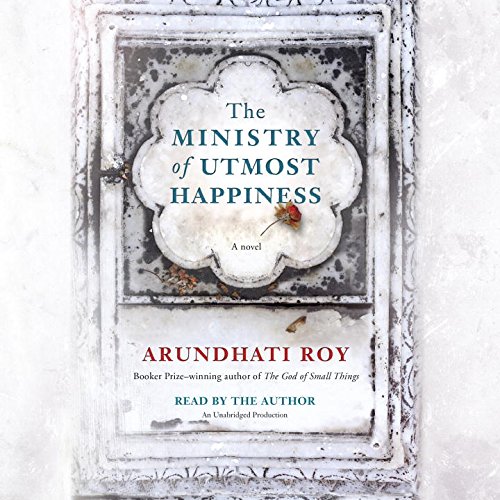
A dazzling, richly moving new novel by the internationally celebrated author of The God of Small Things
The Ministry of Utmost Happiness takes us on an intimate journey of many years across the Indian subcontinent—from the cramped neighborhoods of Old Delhi and the roads of the new city to the mountains and valleys of Kashmir and beyond, where war is peace and peace is war.
It is an aching love story and a decisive remonstration, a story told in a whisper, in a shout, through unsentimental tears and sometimes with a bitter laugh. Each of its characters is indelibly, tenderly rendered. Its heroes are people who have been broken by the world they live in and then rescued, patched together by acts of love—and by hope.
The tale begins with Anjum—who used to be Aftab—unrolling a threadbare Persian carpet in a city graveyard she calls home. We encounter the odd, unforgettable Tilo and the men who loved her—including Musa, sweetheart and ex-sweetheart, lover and ex-lover; their fates are as entwined as their arms used to be and always will be. We meet Tilo’s landlord, a former suitor, now an intelligence officer posted to Kabul. And then we meet the two Miss Jebeens: the first a child born in Srinagar and buried in its overcrowded Martyrs’ Graveyard; the second found at midnight, abandoned on a concrete sidewalk in the heart of New Delhi.
As this ravishing, deeply humane novel braids these lives together, it reinvents what a novel can do and can be. The Ministry of Utmost Happiness demonstrates on every page the miracle of Arundhati Roy’s storytelling gifts.An Amazon Best Book of June 2017: To read The Ministry of Utmost Happiness is to immerse yourself in years of India’s religious, political, and cultural changes and to feel it all through the narrative of an incredible cast of characters. What becomes apparent throughout their individual stories is that power and belief are malleable, that suffering does not end but merely changes hands, and what is revered can easily become reviled. The latter shows up most clearly for Anjum, formerly Aftab, who becomes a famous Hijra in Delhi, only to later find herself keeper of a graveyard sanctum for others who are no longer welcome in the new society. Yes, there is a lot of violence and heartbreak in this novel, but Roy also suffuses it with humor, irony, and –more than anything– the ability of love and acceptance to heal the broken. Even when, or perhaps,especially when, it comes from places one would never expect. The Ministry of Utmost Happiness is complex and compassionate, and the heart and soul that Arundhati Roy so obviously gave to it is worth every one of the many years it’s taken to give us another fictional masterpiece. –Seira Wilson, The Amazon Book Review

Brilliant! In her characteristic society-ripping critique, Arundhati Roy exposes every nastiness directed at every oppressed group within a country that’s nothing if not complicated.This is utterly brilliant writing, that lays bare India’s bureaucracy and mini-despots at the same time sharing its richness and beauty. Soak it up.
Don’t expect a cohesive plot, just relish the characters and settings I expected to love this book. I loved âGod of Small Thingsâ and several of my all-time favourite books are by Indian authors. So after approaching it full of anticipation and expectations, it pains me to say that I found it almost unreadable. Which is feel sure is more about me and my failure as a literary reader. But I did not âgetâ it.
The Coming Together of The Outcasts This novel is about the marginalized people in modern India–people living on the periphery–the transgenders, Dalits (untouchables), Muslims, Kashmiris, people not included in the rising capitalist India. Aftab, who later changes his name to Anjum, is born to Muslim family in old Delhi. His mother notices that there is something not quite right with him, he has both the male and female body parts. Despite familyâs best effort Anjum moves out of the house and starts living with other…